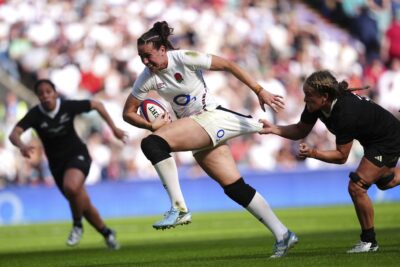From surgeries to comebacks: Rugby stars defy odds to shine at Women’s World Cup
By Canadian Press on August 27, 2025.

LONDON (AP) — Heartbreaking sports injuries before major events are as fated as sunset. The Women’s Rugby World Cup is no different.
Charlotte Caslick gave up the captaincy of Australia’s world champion sevens team to be a World Cup Wallaroo but withdrew from the squad this month after running out of time rehabbing the right ankle she broke last month. However, she’s on standby for the knockout rounds.
In tune-ups against Ireland this month, Canada flanker Pamphinette Buisa injured her arm and was ruled out a week before the World Cup, and Scotland fullback Lucia Scott broke her hand and had to drop out.
Ireland suffered its own major blows in April when two key flankers went down; Erin King, the world breakthrough player of 2024, to a knee injury, and Dorothy Wall to an Achilles tendon injury.
But some players do manage to come back, and here’s their stories.
Emily Scarratt, England
Scarratt became the first Englishwoman to appear in five World Cups last Friday in the opening win over the United States, but that was far from a certainty.
She went under the knife in September 2023, her neck opened up and windpipe moved aside to replace a disc pressing on her spinal cord. Scarratt suffered the injury in January that year, but mixed medical advice and the thought of surgery delayed her green light for it until it became an issue of prolonging her life, let alone her rugby career.
The operation was a success.
But after 13 months off the rugby field, and despite starting in the World Cup finals of 2010, 2014, 2017 and 2022, the center discovered she was no longer a starter for England, and sometimes not even a bench player. She was, however, good enough to get into the World Cup squad. The 35-year-old described her historic fifth selection as “super cool.”
Coming back from neck surgery has made Scarratt feel more free. “In a strange way,” she told the England Rugby website, “it felt like a second chance.”
Her greatness is already certified: A 10-time Six Nations winner and the all-time leading point-scorer for England, the Six Nations and the World Cup.
“Emily brings more than just experience,” England coach John Mitchell said. “She understands the legacy of the Red Roses and brings leadership to the younger players. She’s very calm in demeanour and just leads by example. She wants to leave the Red Roses in a better place.”
Sophie de Goede, Canada
Barely a month had passed since Canada’s historic first test win over world champion New Zealand when captain Sophie de Goede tore her ACL while in camp with the national sevens squad in California.
That was in June 2024.
De Goede made her test comeback last month, 13 months later, off the bench to help Canada put daylight on South Africa to complete a two-test series win in Gqeberha.
The injury was cruelly timed. She missed Canada winning the Olympic sevens silver medal in Paris, the WXV 1 and Pacific Four.
The goalkicking forward made enough of an impression in the first half of 2024, however, to make World Rugby’s annual women’s dream team, two years after her first dream team pick and first nomination for world player of the year.
When Canada finally recalled her, she told the Canadian Press “It has been a really long, long, tough year. I’ll be a lot stronger for it, mentally and physically, coming out the other side.”
De Goede led Canada to the semifinals at the 2022 World Cup but hasn’t been restored to the captaincy since her injury. As de Goede is still getting up to speed, center Alex Tessier leads Canada in this World Cup.
Her talismanic status in the squad was undimmed, though. She came flying around off a lineout ball to score Canada’s opening try against Fiji on Saturday in York and kicked four conversions in the 65-7 win.
“It felt good to just get a strong start under my belt, trying to feel more comfortable coming back from injury,” de Goede said. “That was a nice way to kick it off.”
Brianna Hoy, Australia
Like Sophie de Goede, Brianna Hoy tore her ACL in training, too, while with Australia in Belfast for the WXV 2 last September.
The loosehead prop didn’t play another test until last Saturday in Manchester, where she made her World Cup debut off the bench in Australia’s 73-0 win over Samoa.
At the time of the injury, Wallaroos coach Jo Yapp said, “It’s heartbreaking. She’s an extremely popular member of the squad. She’s kind, caring and professional in everything she does.”
Hoy excelled in training to earn Yapp’s faith again, and at last week’s announcement of the team to play Samoa her name received the biggest cheer among the squad.
After playing 33 minutes on Saturday, Hoy admitted to doubting she would reach the World Cup, especially as the ACL tear was the second of her career.
“I’m just ecstatic to be able to lace the boots up again and take the field with my team,” she said.
“It’s been worth it. I mean, anyone that’s been through a longer-term injury, you have those ups and downs, physically, emotionally and mentally, where you do doubt yourself, whether you are going to get to your goal. The feeling of running on with my mates, I was ecstatic to be there, and I was just super confident and proud of the hard work the team and myself have put in to get to that point.”
Emma Wassell, Scotland
Emma Wassell went to the hospital with what she thought was bread stuck in the back of her throat.
Instead, doctors found a benign tumor in her chest.
Three months later in November 2024, Wassell had the tumor removed. It was a traumatic time. Her mother died just months earlier.
Scotland rugby’s ironwoman — she played a record 54 consecutive tests — received an outpouring of support from the community and, after two weeks in hospital, made the World Cup a goal which drove her recovery.
Her biggest test came in training. The first hit to her chest shook her.
“I got a scare and I almost had to feel it and realise I’m fine, I’m absolutely fine,” she told the BBC. “I had a wee cry and then it was about just taking a couple of days and then back into it. And then I realised, OK, it’s on, we’re ready.”
Wassell played her first test in 454 days last month, an emotional start in a warmup against Italy. She went for 62 minutes.
She played her 70th test on Saturday in her second World Cup as Scotland beat Wales 38-8 in Manchester.
Wassell said she’s grateful to get where she has but doesn’t want the tumor to define her.
“We joke a lot about it,” she told the BBC. “I say, ‘I do actually play rugby, I didn’t just have a tumor. There’s more to me, I swear.’ I don’t want anyone to think any differently (of me) other than she’s a pretty good rugby player.”
___
AP rugby: https://apnews.com/hub/rugby
Foster Niumata, The Associated Press
-47




